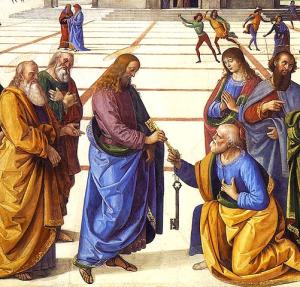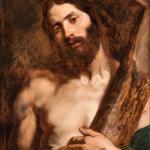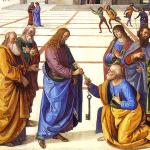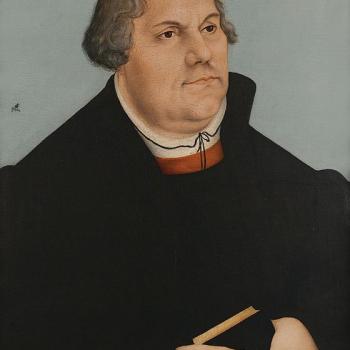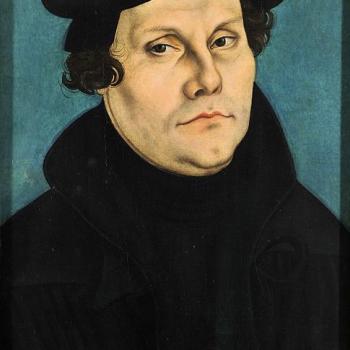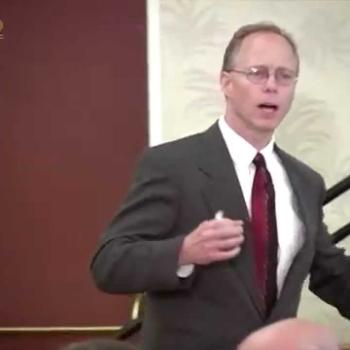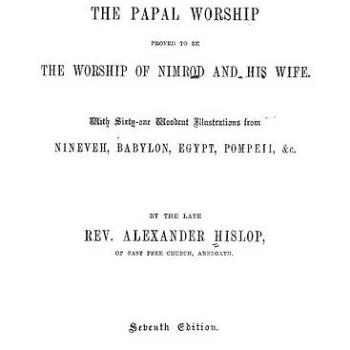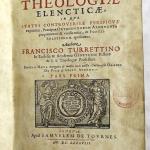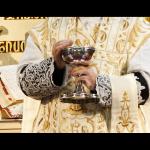Lucas Banzoli is a very active Brazilian anti-Catholic polemicist, who holds to basically a Seventh-Day Adventist theology, whereby there is no such thing as a soul that consciously exists outside of a body, and no hell (soul sleep and annihilationism). This leads him to a Christology which is deficient and heterodox in terms of Christ’s human nature after His death. He has a Master’s degree in theology, a degree and postgraduate work in history, a license in letters, and is a history teacher, author of 27 self-published books, as well as blogmaster (active on and off) for six blogs. He has many videos on YouTube.
This is my 60th refutation of Banzoli’s writings. For almost half a year (5-25-22 to 11-12-22) he didn’t write one single word in reply, because my articles were deemed to be “without exception poor, superficial and weak . . . only a severely cognitively impaired person would be inclined to take” them “seriously.” Despite this childish rationalizing, he found my refutations so “entertaining” that he bravely decided to “make a point of rebutting” them “one by one”; this effort being his “new favorite sport.”
He has now replied to me 15 times (the last one dated 2-9-23). I disposed of the main themes of his slanderous insults in several Facebook posts under his name on my Anti-Catholicism page. I plan (by God’s grace) to ignore the insults henceforth, and heartily thank him for these innumerable blessings and extra rewards in heaven (Matthew 5:11-12).
Google Translate is utilized to render Lucas’ Portugese into English. Occasionally I slightly modify clearly inadequate translations, so that his words will read more smoothly and meaningfully in English. His words will be in blue. Words from past replies of mine to him will be in green.
*****
This is my reply to Lucas Banzoli’s article, “Refutando as “20 maiores provas bíblicas” que Dave encontrou do papado de Pedro (Parte 1)” [Refuting the “20 Greatest Biblical Proofs” Dave Found for the Papacy of Peter (Part 1)] (1-22-23). Despite his heroic resolve to refute any and all of my [now 60] critiques of his arguments “one by one,” for some odd reason he chose to pass over my massive four-part counter-reply, “Reply to Lucas Banzoli’s 205 Potshots at St. Peter” (5-26-22) and to concentrate on my older article (not directed towards him): “Top Twenty Biblical Proofs for the Office of the Papacy” (12-12-15). Obviously, twenty arguments are easier to address than 205, but one hopes to see him defend his larger effort, which I disposed of over eight months ago now.
1. Matthew 16:18 (RSV) And I tell you, you are Peter, and on this rock I will build my church; and the powers of death shall not prevail against it.
The rock (Greek, petra) is St. Peter himself, not his faith. Jesus is the Architect who “builds.” Today, the overwhelming consensus of biblical commentators of all stripes favors this traditional Catholic understanding. St. Peter is the foundation-stone of the Church, making him head and superior of the family, but not founder of the Church; administrator, but not Lord of the Church.
I admire the effort, but there are several problems with this argument. First: the text says “you are Peter”, not “you are pope”.
That’s perfectly irrelevant. A concept can be present in a passage without having a word usually associated with it. The classic example is the absence in the NT of the word “Trinity.” Apologists like myself have provided hundreds of biblical proofs of the Holy Trinity and deity of Christ. The lack the word “Trinity” is no argument against any of them. In this instance, the historical debate is whether Jesus called Peter himself the “Rock” and built His Church upon him (obviously as its human, earthly leader), or whether it was merely his faith (as Protestants has historically tried to argue, but much less so now).
Even if the text really were to be understood in the sense that Dave wants and needs (i.e., that Peter was the “rock” of the text in question), that would still not make Peter a pope, and the proof of this is what he claims himself when he says that “biblical commentators of all stripes” defend this interpretation. If non-Catholics defend this, it is because the text does not prove any papacy (otherwise, they would be Catholics too).
It’s not the entire papacy that can be proven from this passage (let’s not get ahead of ourselves), but merely one key aspect of it: whether the Church was built “upon” Peter and whether he was the leader in the early Church. Papal succession, or an institutional papacy is a separate, entirely different argument, that I have also dealt with: The Biblical Argument for Papal Succession [12-12-15]; Papal Succession: A Straightforward Biblical Argument [4-28-17].
Many of the very best Protestant commentators (like D. A. Carson and R. T. France) exegete the passage in the same manner that Catholics today do. See: Protestant Scholars on Matthew 16:16-19 (Nicholas Hardesty) [9-4-06]. This is important to note because it proves that it’s not merely “Catholic bias” that causes someone to interpret the passage in terms of Peter being the Rock.
Just to cite one example, in another text Paul is not just called a “rock”, but actually the leader of the “sect of the Nazarenes”, as Christians were called (Acts 24:5), and yet no one considers Paul a “pope”.
In that instance, it is Tertul’lus, spokesman for the high priest Anani’as who made this judgment (rather than Jesus Himself saying that He will build His Church on Peter the Rock), and he didn’t say (in RSV) that Paul was “the ringleader” of Christians, but “a ringleader.” This makes a huge difference. “A ringleader” is not the head or supreme leader.
In over thirty English versions for Acts 24:5, all have “a ringleader” or “a leader” with the exception of just one, which has “the ringleader”: as Banzoli argues. And that version is the MSG, or The Message: surely not one of the major English translations. It’s on the extreme end of the spectrum of paraphrased translations and uses contemporary American slang. To get an idea of what it’s like, here is the Lord’s Prayer (Mt 6:7-13):
Our Father in heaven,
Reveal who you are.
Set the world right;
Do what’s best—
as above, so below.
Keep us alive with three square meals.
Keep us forgiven with you and forgiving others.
Keep us safe from ourselves and the Devil.
You’re in charge!
You can do anything you want!
You’re ablaze in beauty!
Yes. Yes. Yes.
Okay! Not my kind of Bible, to be sure (in 2014 I actually edited a New Testament derived from five other versions that sought to maintain Victorian “high” British language). But this is the only one in a long list that translated the way Banzoli thinks this text should be rendered. Not impressive . . .
Apparently, in the mid-60s AD, the Jews were not yet aware that Peter was the leader of the Church, and Paul only a subordinate
They may or may not have known who the leader was, though Peter was confronting them as the ostensible leader before Paul ever did (Acts 4:1-13), and they may have thought that Stephen was the leader before they stoned him to death (Acts 6-7). That’s neither here nor there, in the final analysis. The important thing is the person that Jesus decided to make the leader of Christians.
The problem is compounded when we consider that the vast majority of Church Fathers – who for Dave were good Roman Catholics – considered the stone to be Jesus or Peter’s confession of faith in Christ, not Peter himself
Patristic exegesis of texts changes or develops through the centuries. Catholics are not bound to their interpretations (or to hardly any binding exegetical interpretations at all, for that matter).
Suffice it to say that the problem goes beyond the bad exegesis of the text itself, because the Catholic interpretation subverts the scheme present throughout the NT, where Jesus is always and invariably the rock on which all Christians (including Peter) are built (Col. 2:6-7; Rom 9:32-33; 1Co 10:4; Mk 12:10; Matt 21:42; Acts 4:11). Peter himself said that Jesus is “the chief stone” (1Pe 2:7) and that we are “living stones” built on his foundation (1Pe 2:4-7). And to put an end to any discussion, Paul said that “no one can lay any foundation other than what is already laid, which is Jesus Christ ” (1Co 3:11). That is, there is only one foundation, and that foundation is Jesus. It’s impossible to be clearer.
I disposed of this typically “either/or” false dichotomy (very typical in Protestant thinking) in this article: Can Christ & Peter Both be “Rocks”? [4-21-22].
It is the same analogy of the body, present in so many biblical texts that speak of the Church as the “body” (Col 2:17; 1Co 12:12, 27; Eph 3:6, 5:23) and of Christ as the “head ” (Eph 1:22, 4:15, 5:23; Col 1:18; 1Co 11:3), indicating authority and government.
He is ultimately the head, but He understood that the Church also needs live, flesh-and-blood leaders, in order to bring about order and a hierarchical structure, to determine true doctrine. God spoke through human beings all through history (Moses and the prophets being obvious examples).
Thus, to say that Peter is the rock on which the Church is built is more than ignoring the most basic principle of biblical hermeneutics (that “the Bible interprets the Bible”, that is, that the clearest texts shed light on the more obscure); it is to infer that Peter is above Christ in the government of the Church, which is nothing more than blasphemy . . . [this] is to place the creature above the Creator – something the Papists understand well.
But no informed Catholic has ever said such an idiotic thing, so this is just one of Banzoli’s many straw men.
2. Matthew 16:19 I will give you the keys of the kingdom of heaven . . .
The “power of the keys” (according to many Bible commentators) has to do with ecclesiastical discipline and administrative authority with regard to the requirements of the faith, as in Isaiah 22:22 (cf. Is 9:6; Job 12:14; Rev 3:7). This entails the use of excommunication, absolution, imposition of penances, and legislative powers. In the Old Testament a steward, or prime minister is a man who is “over a house” (Gen 41:40; 43:19; 44:4; 1 Ki 4:6; 16:9; 18:3; 2 Ki 10:5; 15:5; 18:18; Is 22:15, 20-21).
the Isaiah text says “And I will place on his shoulder the key of the house of David; he shall open, and none shall shut; and he shall shut, and none shall open.” (Is 22:22). Although many Catholics apply this text to Peter, it actually refers to Jesus, as we see in the parallel reading of Revelation
There are lots of dual applications in Scripture (as I explained at length to an atheist). The immediate application in Isaiah 22:22 (this is the exegesis that Banzoli constantly calls for) is to Eliakim (22:20). That’s the reason why Catholics cite this. It shows that a man can have a very high administrative office, helping the king (the analogy to God). Likewise, popes help administer God’s will for His Church, with the protection of the Holy Spirit.
It is true that Dave, unlike other Catholic apologists, does not explicitly say that Peter has the keys cited in these texts,
I do say that, because (again) it was Jesus Who gave them to him.
Conclusion: in his deliberate attempt to confuse the reader,
Note the almost ubiquitous charge that I am a deliberately dishonest deceiver and don’t truly believe in what I write about and defend. I usually ignore the insults (per what I stated in the standard introduction above), but I wanted to provide readers with just one example of hundreds that I have to constantly ignore: sort of like a billion mosquitoes . . .
Needless to say, lies like these poison any hope of true dialogue (which presupposes the sincerity and good will of the opponent). Banzoli makes it impossible. I only reply to him in order to prove to observers of the exchange how terrible and unworthy of belief his (sincerely held) arguments are.
Dave quotes texts that . . . say nothing about keys,
Isaiah 22 certainly discusses “keys” as a symbol of administrative leadership. Many reputable Protestant commentators note that this was the reference Jesus was making in Matthew 16:19.
He literally tries to take the texts that say that Jesus has the keys in the sense of authority
Isaiah 22 is not about Jesus. It’s about Eliakim. The great Protestant Bible scholar F. F. Bruce observed:
And what about the “keys of the kingdom”? . . . About 700 B.C. an oracle from God announced that this authority in the royal palace in Jerusalem was to be conferred on a man called Eliakim . . . (Isa. 22:22). So in the new community which Jesus was about to build, Peter would be, so to speak, chief steward. (The Hard Sayings of Jesus, Downers Grove, Illinois: Intervarsity Press, 1983, 143-144)
and apply them to Peter (as if Peter has the keys/authority that Jesus has, which is not even a bad argument, but a blasphemy indeed).
It’s applied analogically to Peter by Jesus Himself. If Jesus wills to give Peter these “keys” who are we to second-guess Him? But in effect, that’s what Banzoli is forced to do, because he has to take an “anti-Peter” / “anti-Catholic” view of the passage. It’s obviously not opposed to Jesus, if Jesus Himself wills the thing. But that would actually be logical (not Banzoli’s strong suit).
And I say that not as a bald insult, but as the studied determination based on my observation of his arguments, in the course of 60 critiques. He’s just not very good at logical thinking or at debating. That’s why he has to constantly insult, to sort of “fill in the blanks.”
If we were as dishonest as Dave and used the very same criteria that he uses in this fruit salad of biblical texts, we could conclude that Peter also has the keys of death and Hades, since Jesus said that “I am alive for evermore, and I have the keys of Death and Hades.” (Rev 1:18),
Sheer nonsense. We can’t say that because the parallel that Jesus drew from, in giving Peter the keys, — Isaiah 22 –, doesn’t say it. Revelation 1:18 is about drawing from the passage (which happens all the time in Scripture: it’s called “types and shadows”) and making further application of it to Jesus. Therefore, this aspect is not one that Peter possesses.
for Dave any “key ” is the same “key” and does the same thing. This is Armstrong’s crude level of exegesis, . . .
This is an example of one of many of Banzoli’s fantasies pulled out of a hat, which purport to “explain” how I think (when in fact I never thought this at any time). The analogical argument from Isaiah 22 is found in many many Protestant commentaries. It’s not merely a “Catholic thing.”
The question is, do we really have a text analogous to Matthew 16:19 that would serve to shed light on it? And the answer is just two chapters later, in Matthew 18:18:
“Truly, I say to you, whatever you bind on earth shall be bound in heaven, and whatever you loose on earth shall be loosed in heaven.” (Matthew 18:18 )
By “you”, Jesus meant all twelve apostles (Peter included, but not just him). Note that the language is exactly the same as in Matthew 16:19 . . . In other words, we are dealing here with exactly the same thing. Jesus gave to Peter the same as he gave to all the disciples, not some special or differentiated burden from others, which would put him above them.
The point (which Banzoli sadly misses so often) is that Peter receives the keys in a preeminent sense as the leader. He is given them as an individual (and the only person who was said to receive them; the analogy to Isaiah 22); the others in Matthew 18:18 are a collective.
This is exactly analogous to popes and bishops in the Catholic Church. Bishops can bind and loose in their own domain, but popes can do it over the entire Church, in certain situations. And popes in ecumenical councils have a veto power, or power to modify, over the resolutions of bishops.
The context has nothing to do with universal jurisdiction over the entire Church, but only speaks of excommunication: “If he refuses to listen to them, tell it to the church; and if he refuses to listen even to the church, let him be to you as a Gentile and a tax collector.” (Mt 18:17).
Matthew 18:17 is not the “context” of Matthew 16:19 at all. It’s absurd and dumbfounded to claim so. The latter was uttered at Caesarea Philippi, which is 25 miles north of the Sea of Galilee, where Capernaum was (Mt 17:24), where the sayings of Matthew 18 took place. In-between, Jesus and the disciples went to the mount of transfiguration (Mt 17:1-2), which was Mt. Tabor: 55 miles away from Caesarea Philippi and thirty miles from Capernaum.
Thus, in-between the two sayings, there were travels of 55 miles to the transfiguration, and then another 30 to Capernaum (I visited all three sites myself in 2014). Yet Banzoli claims that the “context” of Matthew 16:19 is Matthew 18:17. This is sheer nonsense.
Paul ordered excommunication on one occasion (1 Cor 5:5), which proves that (1) this was not the prerogative of a pope,
It was not only his prerogative then and it isn’t now in the Catholic Church. They can be issued by bishops (for their dioceses); and even from regular prelates for religious orders (but priests cannot). There is also such a thing as automatic excommunication for very grave sins.
and (2) Matthew 18:18 is not limited to just the twelve (although Jesus spoke to the twelve), just as Matthew 16:19 is not limited to just Peter (although Jesus did speak to Peter).
I agree! Matthew 18:18 is issued by logical extension to all future bishops, just as Matthew 16:19 is to all future popes, represented by the first pope appointed by Jesus: St. Peter.
If the same words that were addressed to Peter were also addressed to all twelve, and if the concept to which they refer applies beyond the twelve, it is obvious that Jesus was nowhere near saying anything that would make Peter a “pope” or anything close to that.
But they were not completely the same words. Only Peter was given the “keys of the kingdom of heaven” according to the inspired Bible.
Banzoli reiterates the same nonsense that I have just refuted in his next section, so I need not spend any further time on that.
4. Peter alone among the apostles receives a new, solemnly conferred name, Rock, (Jn 1:42; Mt 16:18).
God also changed her name from “Sarai” to “Sarah”. Does it mean Sarah became a pope?
I guess Banzoli missed my qualifier, “among the apostles.” Because of that he goes on to make one of his famous (or infamous) non sequiturs. Changes of name in the Bible denote significance. Therefore, the insinuation is that Peter was the most significant (i.e., the leader of) the original twelve disciples: who were clearly as a group the leaders of early, post-Pentecost Christianity.
If only Jesus had changed Simon’s name to something that meant “leader” or “boss” or “father” (hence the word “pope”), we might even be open to discussion.
Being the “Rock” upon which Jesus built His Church is quite sufficient for the purpose.
5. St. Peter’s name occurs first in all lists of apostles (Mt 10:2; Mk 3:16; Lk 6:14; Acts 1:13). Matthew even calls him the “first” (10:2). Judas Iscariot is invariably mentioned last. This means something.
If the fact that Peter is cited first in lists of disciples means that he was pope, what about when Peter is not cited first in texts that mention someone outside the Twelve? Let’s see an example:
“and when they perceived the grace that was given to me, James and Cephas and John, who were reputed to be pillars, gave to me and Barnabas the right hand of fellowship, . . .” (Galatians 2:9)
Yeah, I addressed that: Did St. Paul Seek St. Peter’s Approval for His Ministry? (+ Does The Word Order in Galatians 2:9 Suggest a Lowering of Peter’s Primacy?) [4-27-17 and 9-4-17].
Note, first, that Peter is called a pillar, not a foundation – which in itself already refutes the Catholic interpretation of Matthew 16:18, that Peter is the very foundation of the Church.
It’s not even an interpretation; Jesus said it! A “rock” upon which something else is built is a foundation. That’s why it is an important discussion to determine if Peter himself was the rock, or just his faith.
And even “being the most prominent” is very different from being “pope”, which means ruling over others. In this sense, Christ himself was clear in saying that “ call no one on earth your father, for one is your Father, who is in heaven” (Mt 23:9), which is where the term “pope” comes from.
See: Biblical Evidence Regarding Calling Priests “Father” [2-24-16].
It is only in Dave’s not-quite-sober mind that the fact that someone is mentioned first must necessarily mean that he is more important – or, worse still, that he exercises a papacy over all others, with “full, supreme and universal power”, as the Catholic catechism says (#882). The kind of argument that’s far more facetious than childish, . . .
See: St. Peter Listed First in Lists of Disciples: A Debate (vs. Jason Engwer) [10-12-20].
7. Peter was the first apostle to enter the empty tomb of the risen Jesus (Jn 20:6).
Peter wasn’t even the first to enter the tomb, because if Dave went back just five verses, he would find that Mary Magdalene got to the tomb before him (John 20:1). . . . I still don’t know how no Catholic authority (a bishop, a cardinal or the pope himself) didn’t realize Dave’s genius and elevated Magdalene to the rank of popess.
See that word “enter” above, in my statement? It means something. John 20:1 never states that Mary Magdalene entered the tomb. She may have, but we would never be able to determine that from this text alone.
9. Peter is regarded by Jesus as the Chief Shepherd after Himself (Jn 21:15-17: “Feed my lambs . . . Tend my sheep . . . feed my sheep.”), singularly by name, and over the universal Church, even though others have a similar but subordinate role (e.g., Acts 20:28; 1 Pet 5:1-2).
Nowhere in the text does Peter call the “Supreme Shepherd”. This is again Dave putting his daydreams into the text, rather than extracting from the text simply what the text says.
What do we call the folks who feed and tend sheep? Why, it’s shepherd! DUH!!!! Jesus is commissioning Peter to tend to His sheep (i.e., Christians). That is precisely being Jesus’ chief shepherd. Jesus says this to no other of His disciples.
To make matters worse, in 1 Peter 5:1-2, Peter himself explicitly says that “I do so as an elder like them”, not as a superior, as Dave claims. If he was right in his thesis that John 21:15-17 refers to a “Supreme Shepherd” and in these other texts only to “subordinate shepherds”, Peter would have said that “I do so in the capacity of a Supreme Shepherd above them”, and not “an elder like them”.
Exactly! Just like Jesus said, “For the Son of man also came not to be served but to serve” (Mk 10:45). Jesus washed their feet, and said, “No longer do I call you servants, for the servant does not know what his master is doing; but I have called you friends,” (John 15:15) and “You know that the rulers of the Gentiles lord it over them, and their great men exercise authority over them. It shall not be so among you; but whoever would be great among you must be your servant, and whoever would be first among you must be your slave” (Mt 20:25-27).
St. Peter, then, is quite obviously following Jesus’ example of humility. But I suppose that is too complex and spiritual and biblical for Banzoli to grasp. Otherwise, he wouldn’t have made such a stupid “argument.”
to say that there is another “Supreme Shepherd” besides Jesus is more than saying what no text says: it is blasphemy, which tries to rob Christ of his place and give it to Peter (and, worse than that, to popes “by logical extension”!).
I didn’t claim that. I referred to Peter as “the Chief Shepherd after Himself.”
This is why the pope calls himself the vicar (literally “substitute”) of Christ, in a supreme example of the usurpation of the one who is called the only high priest (or high priest) of Christians (cf. Heb 4:14, 6: 20, 8:1, 8:6, 9:11, 10:21).
It’s the sort of language (agents, ambassadors, etc.) that Jesus Himself used, in referring to His disciples (the word “disciple” itself is not far in meaning from “vicar”):
Matthew 10:40 He who receives you receives me, and he who receives me receives him who sent me.
John 13:20 Truly, truly, I say to you, he who receives any one whom I send receives me; and he who receives me receives him who sent me.
We also see instances of radical identification with Jesus, such as the term “Body of Christ” for the Church, or St. Paul partaking in Christ’s afflictions (Col 2:8; cf. 2 Cor 1:5-7, 4:10, 11:23-30; Gal 6:17), or our “suffering with Christ” (Rom 8:17; 1 Cor 15:31; 2 Cor 6:9; Gal 2:20; Phil 3:10; 1 Pet 4:1, 13).
Where’s the beef, then? Jesus routinely refers to something highly akin to “vicar” in these statements (and the Apostle Paul picks up on the motif in a big way). So the pope represents Christ to the world, in a particularly visible, compelling fashion. This is not outrageous blasphemy; it is straightforward biblical usage. Who is being more “biblical”?
Go to Part II: 20 Biblical Proofs for the Papacy, Pt. II (vs. Lucas Banzoli) [2-13-23]
***
Practical Matters: Perhaps some of my 4,000+ free online articles (the most comprehensive “one-stop” Catholic apologetics site) or fifty-one books have helped you (by God’s grace) to decide to become Catholic or to return to the Church, or better understand some doctrines and why we believe them.
Or you may believe my work is worthy to support for the purpose of apologetics and evangelism in general. If so, please seriously consider a much-needed financial contribution. I’m always in need of more funds: especially monthly support. “The laborer is worthy of his wages” (1 Tim 5:18, NKJV). 1 December 2021 was my 20th anniversary as a full-time Catholic apologist, and February 2022 marked the 25th anniversary of my blog.
PayPal donations are the easiest: just send to my email address: apologistdave@gmail.com. You’ll see the term “Catholic Used Book Service”, which is my old side-business. To learn about the different methods of contributing, including 100% tax deduction, etc., see my page: About Catholic Apologist Dave Armstrong / Donation Information. Thanks a million from the bottom of my heart!
***
Photo credit: Detail of Christ Handing the Keys to St. Peter (1481-82) by Pietro Perugino (1448-1523) [public domain / Wikimedia Commons]
***
Summary: Brazilian anti-Catholic polemicist & apologist Lucas Banzoli takes on my “20 Biblical Proofs for the Papacy”, and I offer a systematic, comprehensive counter-reply.
***


